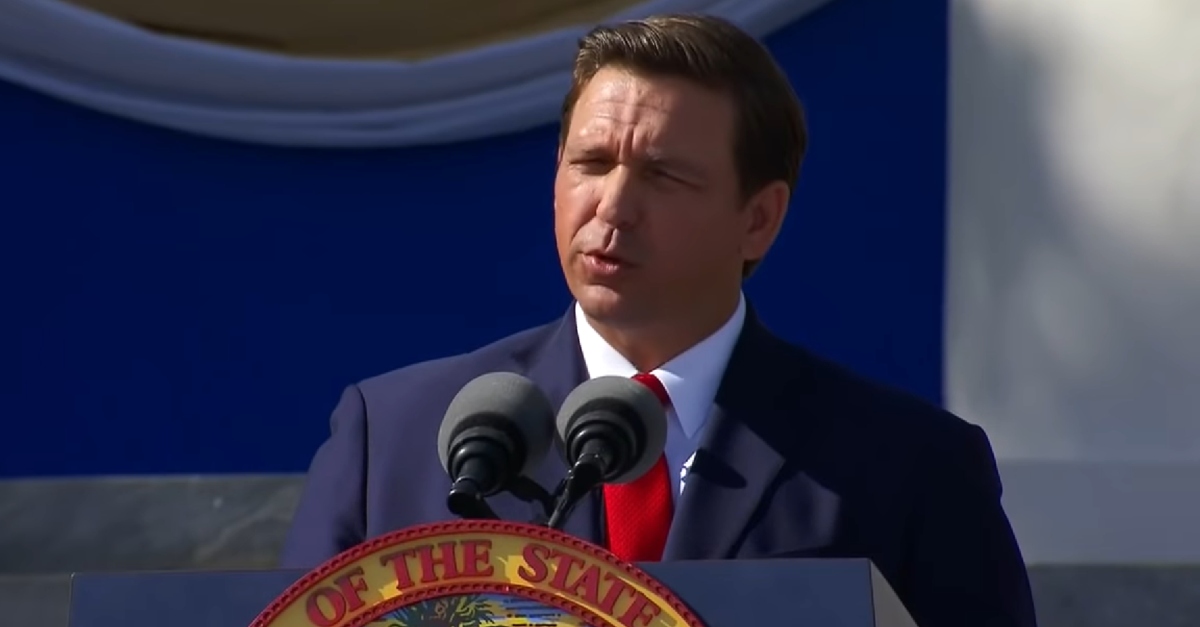
A federal appeals court struck down the Florida GOP’s controversial 21st century poll tax—which, by design, disproportionately impacts black voters. Florida Gov. Ron DeSantis (R), however, quickly signaled his intent to preserve the anti-voting law.
“[T]he requirement that the genuinely indigent pay back all of their legal financial obligations as a condition precedent for access to the ballot violates the Equal Protection Clause of the Fourteenth Amendment,” the 11th Circuit Court of Appeals declared in a 78-page decision late Wednesday morning.
The ruling itself is technically limited to the 17 plaintiffs who brought the suit—but advocates are hopeful that it will soon be enlarged to encompass the entire class of voters affected by the GOP’s poll tax.
”The court has upheld the vital principle that wealth must not be a barrier to voting,” noted Campaign Legal Center in a clarification of the ruling’s immediate impact. “The individual voters in our case WILL be able to vote. We’re hopeful that Florida will take the steps needed so voters who cannot pay their fines and fees may register.”
As Law&Crime previously reported, in 2018, Floridians overwhelmingly voted to allow formerly incarcerated individuals the right to vote. Roughly 65 percent of Sunshine State voters ticked the box in favor of Amendment 4–which was supposed to have allowed some 1.5 million previously disenfranchised people the right to vote.
But the GOP maintained both the state legislature and the governor’s mansion.
Republicans then passed SB 7066 with a quickness, preconditioning the restoration of voting rights on the ability of formerly incarcerated individuals ability to pay–sometimes massive–fines, fees and restitution. Various court battles ensued. Voting rights advocates notched both victories and defeats—leading up to Wednesday’s panel decision.
“Disenfranchisement is punishment,” the court’s opinion notes. “We have said so clearly: ‘[f]elon disenfranchisement laws are unlike other voting qualifications’ in that they ‘are deeply rooted in this Nation’s history and are a punitive device stemming from criminal law.’ Moreover, the Readmission Act of Florida authorized felon disenfranchisement only as punishment. The Act prohibited any change to the state constitution that ‘deprive[d] any citizen or class of citizens of the United States of the right to vote . . . except as punishment for such crimes as [were then] felonies at common law.’”
The court’s decision continues [emphasis theirs]:
What’s more, disenfranchisement is a continuing form of punishment. It is true that two similarly situated felons—two felons who had committed the same crime—were subject to the same punishment (disenfranchisement) on the front end of the sentencing procedure. But much like a prisoner is punished throughout a carceral term, not just when he is initially sentenced to incarceration, so too disenfranchised felons continue to be punished as long as their disenfranchisement continues. The sanction of disenfranchisement cannot be described merely as a one-time revocation of the right to vote; rather, the punishment visits the felon at each and every election. Felons who are unable to pay (and who have no reasoned prospect of being able to pay) will remain barred from voting, repeatedly and indefinitely, while for those who can pay, the punishment will immediately come to an end.
The judges’ ruling was quickly celebrated by progressives and non-partisan voting rights advocates alike.
“This is a great win for voting rights!” said Myrna Perez, director of the Voting Rights and Elections program at the Brennan Center for Justice at NYU Law. “The Eleventh Circuit told the state of Florida what the rest of America already knows. You can’t condition the right to vote on a person’s wealth.”
“The Voting Restoration Amendment passed with 5.2 million votes and was one of the largest expansions of voting rights in United States history,” said Daniel Tilley, legal director of the ACLU of Florida. “Despite the state’s best efforts to dismantle Amendment 4 through SB7066, today’s ruling affirms what Floridians intended when they passed Amendment 4–to restore to returning citizens their right to vote.”
DeSantis and his administration, however, took the opposite view, vowing to pursue an appeal en banc.
“We disagree and will appeal en banc,” DeSantis’s Communications Director Helen Aguirre Ferré tweeted in response to the court’s blockbuster ruling. An en banc review request means that Florida will ask for the full 11th Circuit Court of Appeals to hear and decide the case in a hope that the additional judges will allow the poll tax to stand.
[image via screengrab/Fox News]